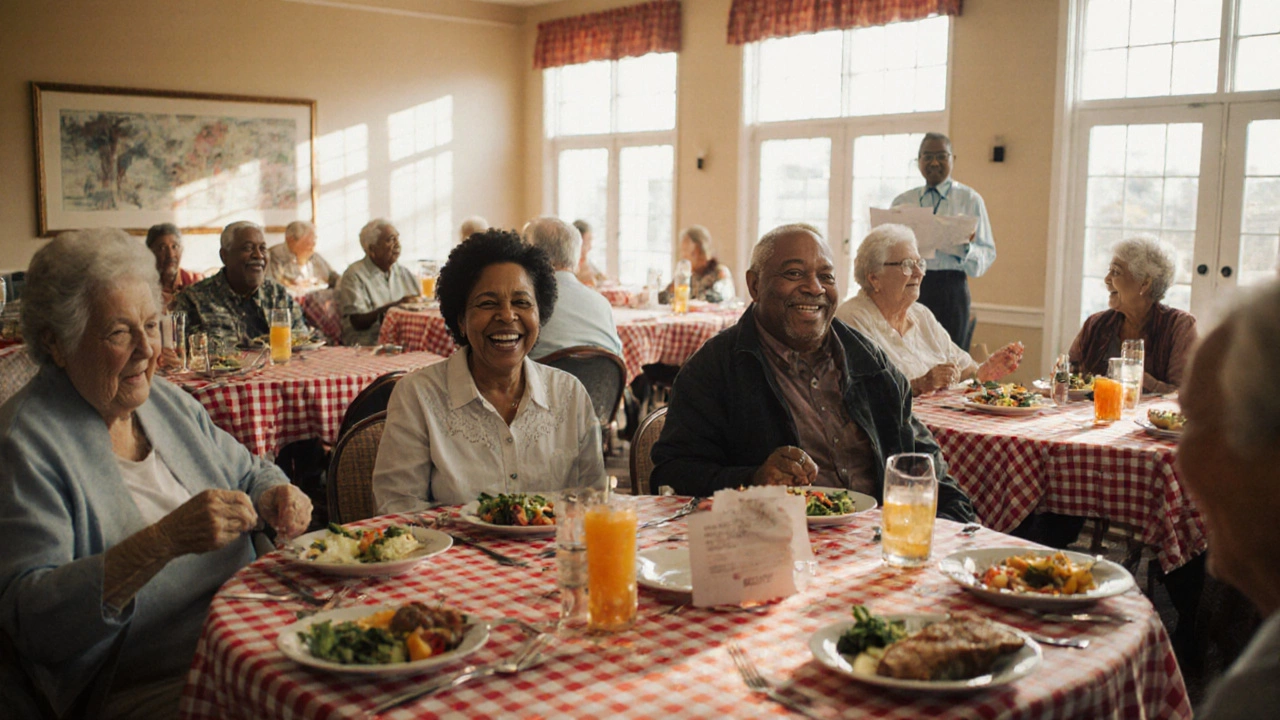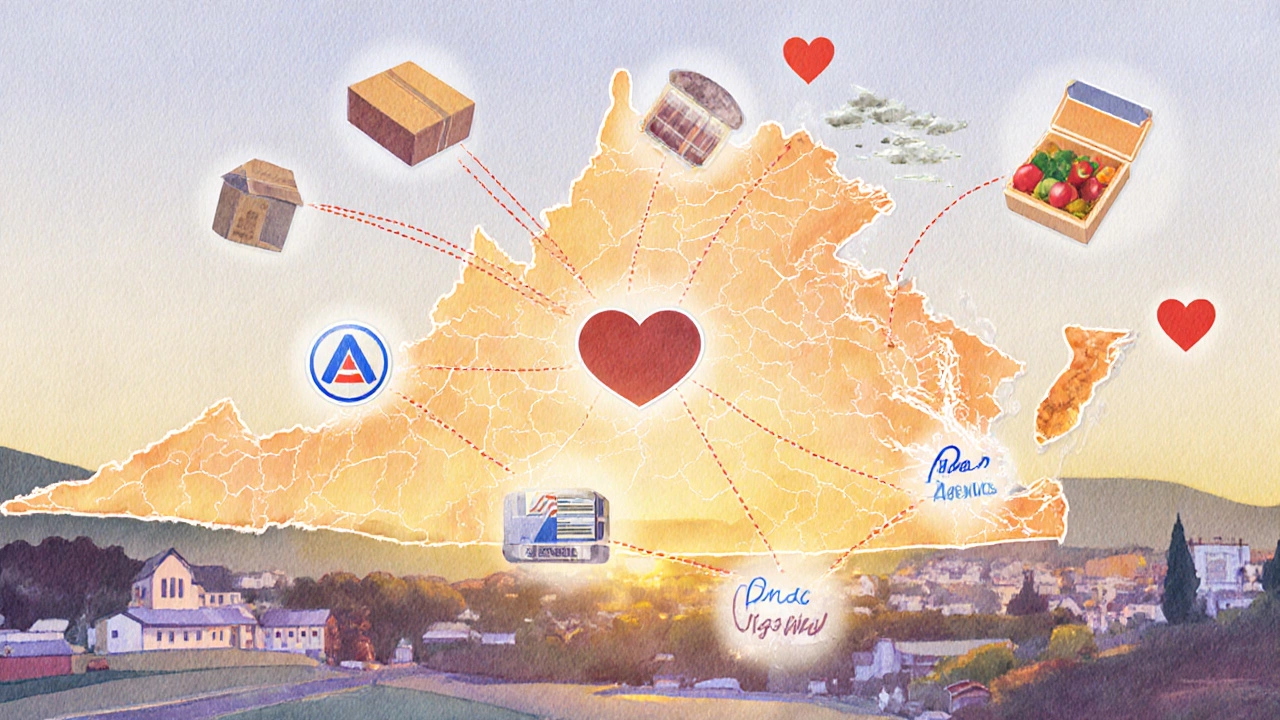Senior Food Program Eligibility Calculator
The Senior Food Program in Virginia provides free or low-cost meals and groceries to seniors aged 60+ who need help with food access. This calculator will help you determine if you or a loved one qualifies.
Every year in Virginia, over 700,000 adults over 60 live on fixed incomes-many of them choosing between paying for medicine, rent, or their next meal. The Senior Food Program in Virginia isn’t just a service; it’s a lifeline for thousands who can’t afford to eat well on Social Security alone. This isn’t a vague charity effort. It’s a state-supported network of meals, groceries, and delivery services designed specifically for older adults who need help getting nutritious food without leaving their homes.
How the Senior Food Program Works in Virginia
The Virginia Senior Food Program is run through the Virginia Department for the Aging, in partnership with local Area Agencies on Aging. These 13 regional offices handle everything from meal prep to delivery, using federal funds from the Older Americans Act. It’s not a one-size-fits-all system. Depending on where you live-Richmond, Roanoke, or even a rural town in Southwest Virginia-the program looks slightly different, but the goal stays the same: keep seniors fed and healthy.
If you’re eligible, you can get one hot, nutritious meal delivered to your door every weekday. These aren’t frozen leftovers. Meals are prepared by local kitchens, often in churches, community centers, or nonprofit kitchens, and meet federal nutrition guidelines. Each meal includes a protein, vegetable, fruit, grain, and dairy-designed for older bodies that need more calcium, fiber, and less sodium.
For those who can’t get out to eat but don’t need delivery, there are congregate dining sites. These are community centers where seniors gather for lunch, socialize, and sometimes get health screenings. Over 250 locations across Virginia host these meals. It’s not just about food-it’s about connection. Loneliness kills faster than hunger for many older adults.
Who Qualifies for the Program
You don’t need to be broke to qualify. The main requirement is being 60 years or older. There’s no strict income cutoff, but priority goes to those with incomes below 185% of the federal poverty level-that’s about $2,400 a month for a single person in 2025. Still, even if you make more, you can usually still get meals, sometimes for a small suggested donation, like $3.
People with disabilities under 60 who live with a senior can also receive meals through the program. Caregivers who prepare meals for elderly household members can sometimes get meals too, so they don’t have to choose between feeding their loved one and themselves.
Immigration status doesn’t matter. The program doesn’t ask for a Social Security number or proof of citizenship. If you’re 60+, live in Virginia, and need food, you’re eligible.
How to Sign Up
Signing up is simple. Call your local Area Agency on Aging. You can find the number for your region by visiting the Virginia Department for the Aging website or calling the statewide helpline at 1-800-552-3402. A case manager will ask for your name, address, age, and a few basic details about your needs. They’ll check if you qualify for home delivery or if there’s a nearby congregate site you can join.
Some counties even let you sign up online through their Area Agency portal. In Fairfax County, for example, you can fill out a form on their website and get a call back within 48 hours. In rural areas like Lee or Buchanan County, the staff might come to your home to help you enroll.
You don’t need to reapply every month. Once you’re in, you stay in unless you move out of state or no longer need the service. Meals continue even if you’re in the hospital temporarily-staff will hold your spot and resume delivery when you’re home.

What You Get: Meals, Groceries, and More
Hot meals are the core, but the program does more. Many sites offer grocery bags for seniors who can’t get meals delivered. These are called “Senior Farmers’ Market Nutrition Program” boxes, and they contain fresh produce, eggs, and dairy-often from local farms. In 2024, Virginia distributed over 120,000 of these boxes.
There’s also the Commodity Supplemental Food Program (CSFP), which gives monthly food boxes to low-income seniors. These boxes include canned meats, peanut butter, cereal, cheese, and juice. You can get both the daily meal and the monthly box if you qualify.
Some programs even include nutrition education. Dietitians visit senior centers to teach how to read labels, manage diabetes with food, or cook with less salt. One woman in Lynchburg, 72, lost 18 pounds in six months after learning how to swap canned soups for homemade vegetable stews.
What Happens on Holidays and Weekends
Meals are delivered Monday through Friday. But the program doesn’t leave seniors hungry on weekends or holidays. Many locations offer frozen meal packs for Friday and weekend use. Some counties deliver extra meals before Thanksgiving, Christmas, and other major holidays. In Hampton Roads, volunteers wrap up 3,000 extra holiday meals each year-turkey, stuffing, cranberry sauce, and pie-all delivered to seniors’ doors.
During extreme weather-blizzards, ice storms, or heat waves-the delivery teams adjust. If roads are unsafe, they call instead. If you’re homebound and can’t answer the door, they leave meals at your doorstep or with a neighbor. No senior is left without food because of bad weather.
How It’s Funded
The program gets money from three main sources: federal grants under the Older Americans Act, state funds from Virginia’s General Assembly, and donations from local businesses and foundations. The federal share covers about 70% of the cost. Virginia adds another 20%, and the rest comes from community contributions.
It’s not a big budget. The entire state program runs on about $42 million a year. But that money goes far. Each meal costs the program roughly $5.50 to prepare and deliver. That’s less than half the price of a meal at a fast-food restaurant. For every dollar spent, the program saves $3.20 in future healthcare costs by preventing malnutrition-related hospital stays.

How You Can Help
If you’re not a senior but want to make a difference, there are plenty of ways to get involved. Volunteers drive delivery routes, pack meals, or visit isolated seniors just to chat. Many churches and civic groups run meal prep teams. You don’t need to be a chef-just show up, wear an apron, and help chop vegetables.
Donations of non-perishable food, gift cards to grocery stores, or even just a few hours a week can make a huge difference. In Roanoke, a local high school student started a project to collect peanut butter and jelly sandwiches for weekend meals. They delivered over 1,200 in one semester.
And if you know a senior who might be struggling-quietly asking if they’re eating well, helping them call the helpline, or even just dropping off a homemade casserole-can be the thing that keeps them healthy and connected.
Common Myths About the Program
Myth: You have to be poor to qualify.
Truth: Income matters for priority, but not for eligibility. Anyone 60+ can get meals.
Myth: The food is bland or low quality.
Truth: Meals are planned by nutritionists. Many seniors say they eat better now than they did when they were working.
Myth: It’s only for people who can’t leave their homes.
Truth: Congregate dining is popular. Many seniors look forward to lunch at the center as much as the food.
Myth: The program is shrinking or being cut.
Truth: Funding has held steady since 2020, and Virginia added 12 new delivery routes in 2024 to cover growing demand.
Is the Senior Food Program in Virginia free?
Yes, meals are free for those who qualify. Some sites ask for a suggested donation of $1-$3, but no one is turned away for not paying. The program doesn’t charge for groceries or meal delivery either.
Can I get meals if I live in a nursing home?
No. The program is for seniors who live independently-at home, in apartments, or in assisted living. If you’re in a nursing home, your meals are covered under Medicaid or your facility’s care plan. The Senior Food Program is designed for those who don’t have institutional support.
Do I need to be a U.S. citizen to qualify?
No. Immigration status is not checked. The program serves all seniors 60 and older who live in Virginia, regardless of citizenship or documentation.
How often are meals delivered?
Meals are delivered Monday through Friday. Most sites provide a frozen meal for weekends and holidays. Some counties offer extra deliveries before major holidays like Thanksgiving and Christmas.
Can I choose what meals I get?
You can request dietary accommodations-like diabetic-friendly, low-sodium, or vegetarian meals. The program can’t always offer custom meals every day, but they’ll do their best to match your needs. If you have allergies or medical conditions, let them know when you sign up.
What if I miss a delivery?
If you’re sick or away, call your local agency. They’ll hold your meal for the next day or deliver it later. If you’re out of town for more than a week, they’ll pause deliveries until you return. No penalties, no paperwork.
Are there meal options for people with dementia or Alzheimer’s?
Yes. Many delivery drivers are trained to recognize signs of confusion or memory loss. Meals are often served in easy-to-open containers with clear labels. Some sites offer finger foods or softer textures for those who have trouble chewing or swallowing. If you or your loved one has dementia, let the agency know-they’ll adjust service to make it safer and easier.
Can I get groceries instead of meals?
Yes. If you can cook but can’t get to the store, you can sign up for the Senior Farmers’ Market Nutrition Program or the Commodity Supplemental Food Program. These give you monthly boxes of fresh produce, dairy, and protein. You can get both meals and groceries if you qualify.
What to Do Next
If you or someone you know is 60 or older and struggling to afford food, don’t wait until it’s too late. Call 1-800-552-3402 or visit the Virginia Department for the Aging website. Even if you think you don’t qualify, ask. The program is designed to help people who don’t ask for help.
And if you’re able-whether you’re a neighbor, a friend, or just someone who cares-help spread the word. A phone call, a ride to a meal site, or even sharing this information online could be the reason someone eats today.
